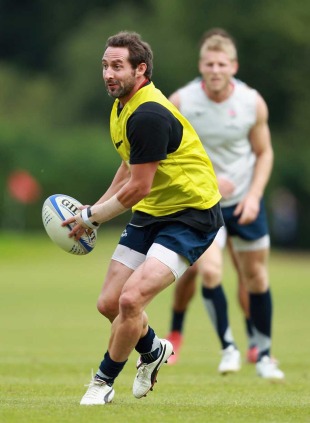|
Comment
Fears for Sevens specialists
John Taylor
September 29, 2010

Ben Gollings is one of the world's leading Sevens players
© Getty Images
Enlarge
In the amateur era, Sevens was a bit of end-of-season fun. You played serious rugby up until Easter, took part in a couple of Sunday warm-up tournaments and then, if you were a London club, brought the curtain down with the Middlesex Sevens at Twickenham. It was the final act of every season, you took it seriously but it was very much a festival of rugby - a chance to show off before going into the long summer break. The only international tournament I can remember was in 1973 when Scotland, where the game was invented, staged an invitation World Cup as part of their centenary celebrations. Now, as the Commonwealth countries assemble their squads and prepare to leave for India it is a very different scene. England have what is virtually a full-time professional squad centrally contracted by the RFU. After Delhi they will prepare for the annual IRB Sevens circuit - with eight tournaments around the world between December and May. There is talk of expanding that to 10 next year. Sevens will become an Olympic sport in 2016 and now plays a vital role in promoting the game around the world. Countries such as China and Russia fund a great deal of their sport through their National Olympic Association. If you are in the Olympics you get massive financial support - if you are not you get nothing. Nigel Melville, now CEO of Rugby USA, recently had to make a presentation to the USA Olympic Committee before being granted admittance, and is waiting, fingers crossed to discover how much backing he is likely to receive. It could transform American rugby. When the IRB Sevens began it was seen very much as a development tool. Kenya cannot compete with the heavyweights in the full 15-a-side game but they have already caused more than a few upsets in Sevens. Although all their giant-killing has happened in far flung places there has been big surge of interest back at home. Both forms of the game are booming. Sevens is easy to understand for players who do not have a rugby tradition and the short, sharp matches, played at a frantic pace, make it a wonderful sport for spectators. But now it is in danger of becoming a totally separate game. Ben Ryan, the England Sevens coach, dismisses the idea that it should be seen mainly as a development tool. A few years ago players would spend a year or two with the Sevens squad to improve their running and passing skills. Many international players refined their game on the Sevens circuit including all-time greats such as Jonah Lomu. That is happening less and less. Players have to make a choice - do they want to concentrate on Sevens or 15s? The techniques and training required are becoming very different. Modern professional players are already pretty lean but the forwards in 15-a-side do need bulk as well. In Sevens that is not required and new training regimes are making body fat levels even lower so they are not able to transfer from one game to the other. Over the last decade most England Sevens players have been attached to Premiership clubs and have been released for Sevens duty as required but head coaches are now loath to sign them because they go missing for three weeks four times a season and they are the wrong size and shape in any case. Fitting them in is too often just not worth the effort. Hence the new central contracts. The RFU has had to find extra cash this season to fund its Sevens squad. Ryan is no doubt delighted - he has total control over his players - but is this extra degree of specialisation good for the game? I have grave doubts. Ben Gollings has been playing for the England Sevens team for over a decade. He has amassed an amazing 2374 points - a record that will probably never be beaten - but he never quite cracked it in 15s and that is the worry. New Zealand, the most successful Sevens nation of them all, still use it as a development tool and a number of current All Blacks came through the system but England are in danger of losing the crossover between the two games completely. When Sevens goes into the Olympics in 2016 I am certain many of the top players will want to take part and if they are denied that opportunity because it has all become too specialised it will be shame. Gollings is a superb Sevens player and, like the great Waisale Serevi before him, deserves all the accolades he receives but the Olympics needs the best players in the world and I believe countries have a duty to make sure they can compete - otherwise it could be seen as a competition for second tier players. Sevens is a wonderful spectacle but it should not be taken too seriously. It started out as a fun way to finish the season and that should never be forgotten. © ESPN Sports Media Ltd.
|
Live Sports
Communication error please reload the page.
-
Football
-
Cricket
-
Rugby
-
- Days
- Hrs
- Mins
- Secs
F1 - Abu Dhabi GP
Abu Dhabi Grand Prix December 11-131. Max Verstappen ()
2. Valtteri Bottas (Mercedes)
3. Lewis Hamilton (Mercedes)
4. Alexander Albon ()
5. Lando Norris ()
6. Carlos Sainz Jr ()
-
ESPNOtherLive >>
Golf - Houston Open
Snooker - China Open
Tennis - Miami Open

